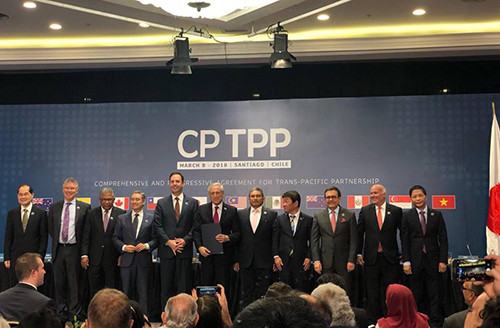CPTPP officially takes effect in Vietnam from January 14, 2019
Vietnam becomes the 7th country to implement the Comprehensive and Progressive Agreement for Trans-Pacific Partnership (CPTPP).
According to the regulation, 60 days from the date the countries notify New Zealand (the depositary country of the agreement) about the ratification of the Comprehensive and Progressive Agreement for Trans-Pacific Partnership (CPTPP), this agreement will take effect for that country.Thus, with the notification to New Zealand from November 15, 2018, today (January 14, 2019) CPTPP officially comes into effect for Vietnam.
Before Vietnam, CPTPP took effect with 6 countries from December 30, 2018, namely Mexico, Japan, Singapore, New Zealand, Canada and Australia.
The CPTPP creates a huge free economic area, with a market of about 500 million people and accounting for 13% of global GDP. CPTPP unifies investment and service regulations for many sectors, gradually eliminating tariffs on agricultural and industrial products.
 |
CPTPP is expected to bring opportunities for Vietnamese goods to be exported to countries that have ratified CPTPP with many tariff incentives, but also with strict conditions. |
The markets of the CPTPP participating countries are large in scale, with the GDP of the whole bloc accounting for 13.5% of global GDP, including Japan, the third largest economy in the world. Therefore, joining the CPTPP is generally beneficial for Vietnam.
Calculations by the National Center for Socio-Economic Information and Forecast (Ministry of Planning and Investment) show that CPTPP will help Vietnam's GDP increase by 1.7 billion USD, exports by more than 4 billion USD, increasing by 1.32% and 4.04% respectively by 2035.
Basically maintaining the content of the TPP agreement, but CPTPP allows member countries to temporarily postpone a few obligations to ensure balance in the new context.
With CPTPP, for the first time, Vietnam committed to cutting nearly 100% of tax lines; committed to public procurement activities; committed to the state-owned enterprise sector; committed to allowing workers to establish workers' organizations that are not necessarily affiliated with the Vietnam General Confederation of Labor; committed to environmental issues, e-commerce...
In addition, the agreement sets out high requirements and standards for transparency and provides a binding and rigorous dispute resolution mechanism.
|
Representatives of 11 member countries signed CPTPP in Chile in March 2018.Photo: Reuters |
Regarding market opening, the countries participating in the agreement agree to eliminate almost all import taxes for each other according to the roadmap; liberalize services and investment on the basis of compliance with the laws of the host country, ensuring State management; thereby creating new business opportunities for enterprises and new benefits for consumers of member countries.
Mr. Ngo Chung Khanh - Deputy Director of the Multilateral Trade Department (Ministry of Industry and Trade) said these are "Vietnam's first commitments to a new generation trade agreement".
The biggest opportunity from CPTPP for Vietnam, according to Mr. Khanh, is not market expansion but institutional reform. In the near future, Vietnam will amend 7 laws and dozens of Decrees in the process of reviewing the law to comply with the provisions of CPTPP, directly applying many commitments, especially in the field of opening services and investment.
Institutional reform is also the "number one priority" emphasized by Dr. Vo Tri Thanh - former Deputy Director of the Central Institute for Economic Management (CIEM) when talking about Vietnam's opportunities from this agreement.
Mr. Thanh said that Vietnam has made many efforts to improve the business investment environment and reform the administrative apparatus, but this is not enough. It is still necessary to go deeper into institutional reform to truly achieve a professional, transparent, and highly accountable state apparatus. At the same time, the market quality in Vietnam must be modern and complete to better integrate into the CPTPP.
"Once you enter the game, you have to accept that there will be risks and challenges. Risks and challenges are sometimes necessary to have good opportunities for sustainable and faster development," Mr. Thanh said.
The CPTPP Agreement was signed by 11 founding member countries including Australia, Brunei, Canada, Chile, Japan, Malaysia, Mexico, Singapore, New Zealand, Peru and Vietnam in March 2018 in Chile.

